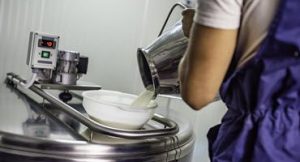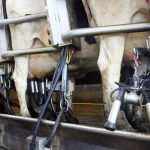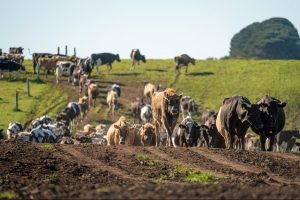
Saputo Dairy Australia has announced a 10 cents kg/MS rise to $7.05 kg/MS.
In June, Fonterra announced a step-up to $6.95c kg/MS.
Fonterra Australia managing director Rene Dedoncker said that since the last price review in August, market conditions globally had remained positive with solid demand and subdued growth in supply.
“We’ve continued to see strong domestic demand, particularly for our consumer brands and we expect to see the foodservice sector rebound as restrictions ease across Victoria and New South Wales,” said Mr Dedoncker said.
“This gives us confidence in the fundamentals of our business and that we can continue to earn and pay a competitive milk price.
He said the challenges of COVID-19 continued to put significant pressure on the supply chain.
“In particular, we are dealing with delays in getting product from our distribution and warehouse partners to our customers,” he said.
“We are also seeing lower than expected milk volumes off farm, owing to the unseasonably wet spring which is limiting our ability to capitalise on the strong commodity market conditions.
“Although we are hopeful that this price signal and the soil moisture will translate to a recovery in milk production in the back half of the season.”
Saputo Dairy Australia has also announced a 10c kg/MS step up.
Saputo suppliers have been told they’ll get another 7c kg/butterfat and 14c/kg protein, to be paid in November.
“This increases our weighted average farmgate milk price in the 2021-22 season, in the Southern Milk Region to $7.05 per kilogram milk solids (up from $6.95 kg/MS),” SDA’s Supplier Relations director Anthony Cook said.
“Our domestic retail business continues to perform well and we hope to see improvements in the food service sector, moving forward, which has been impacted by ongoing lockdowns.”
It follows warnings from the Australian Dairy Products Federation the remaining quarter of 2021 would pose a number of hurdles for processors due to several reasons.
Mr Cook said globally, COVID-19 was continuing to have an impact in some markets, while there were also supply chain challenges due to container shortages and port inefficiencies.
“It is pleasing that, despite these challenges, demand remains strong and prices are relatively stable.”
The company remained optimistic its business plan had the right focus to ensure Saputo had the right focus to ensure it could continue adapting its product mix to meet evolving market needs and receive the best return for every litre of milk.
The next review of the minimum milk price was scheduled for January, next year.

























